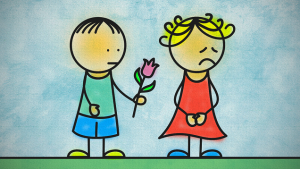Malcolm Gladwell has written a book called Blink, about the thousand decisions we make every day in the smallest slices of time — choices we make in split-seconds during a conversation — that determine how we respond to life at the subconscious level.
 Gladwell writes about an interview with a psychologist who has made a study of watching couples in conversation. This guy has become so adept at watching their non-verbal communication that he can tell with incredible accuracy how likely they are to divorce after just a few minutes of watching them talk. His point is that how we react to other people in the briefest moments (even non-verbally) says a lot about what’s beneath the surface.This psychologist has boiled hundreds of facial expressions down to four major categories. He calls them the Four Horsemen: defensiveness, stonewalling, criticism and contempt. And he says the real killer among those four is contempt.
Gladwell writes about an interview with a psychologist who has made a study of watching couples in conversation. This guy has become so adept at watching their non-verbal communication that he can tell with incredible accuracy how likely they are to divorce after just a few minutes of watching them talk. His point is that how we react to other people in the briefest moments (even non-verbally) says a lot about what’s beneath the surface.This psychologist has boiled hundreds of facial expressions down to four major categories. He calls them the Four Horsemen: defensiveness, stonewalling, criticism and contempt. And he says the real killer among those four is contempt.
“You’d think criticism would be the worst, because it maligns character,” he says. “But contempt is worse, because it puts one person above another. It’s when we look down on another person that we do the most damage.” And it is so damaging, the psychologist says, that it affects our immune system.
Contempt is a killer. No wonder the enemy of our souls has made a career out of getting us to go there. He wants us to make pecking orders. To make ourselves better than others. The enemy has made quite a career out of doing nothing more than keeping your heart hard toward another human being. And it is brilliant, really. He can make it slice both ways, so we feel chronically inadequate while we’re tearing others down so they never feel good enough, either.
That’s the tactic of the enemy of our souls.
In his teaching on forgiveness, Chuck Swindoll asks some good questions:
- Do you free people, or do you hold them hostage?
- Do you relieve them of guilt and shame, or do you increase their load?
- Do you encourage others or discourage them?
- Do you find yourself participating in the world of construction or the world of destruction?
- Do you point out people’s faults and failures or their strengths and accomplishments?
As it turns out, joy flows from the same well as grace, so the goal is to cultivate within ourselves a kind of grace that overflows. To put it plainly, I have to learn to discipline my emotions, especially the emotion of anger, so it doesn’t create opportunity for sin in my life.
How can I drill down and tap into that well of grace?
- Name your spirit of offense. This is what it means to confess your sins. If you won’t name it before the God who already knows it, he is not likely to heal you of it
- Pray daily for those toward whom you have unforgiveness. Ask yourself: What one good quality in this person’s life can I begin with as I pray? Never mind whether they deserve it or not. Here’s the thing. When it comes to grace, “deserve” has nothing to do with it.
- Seek help from others. Sometimes what we need most is another perspective. David Seamands says that when we are angry or depressed, our perceptions change. A little hill becomes a great mountain. But real friends can help you see its true height in perspective.
- Sing! Make music. Its such a simple thought, but it works. If you can’t stop being angry at someone, try singing the thought out of your head. That’s what David did. That’s where a lot of those psalms came from. He chose in the midst of his anguish to praise the Lord.
- Remember and give thanks. This one is related to singing, but different. With this one, we are choosing to look at things differently. We are choosing, like Joseph, to see the big picture and to say, “Maybe the world meant to hurt me, but God means nothing but good from this.” God can use anything, and God can make good out of anything.
- Lean heavily on the power of God’s Word. Because here’s what I’m learning about scripture and about Jesus and about all the things we teach and say: It works. God’s Word is exactly what it promises to be. It is good news for the poor and release for the captives. It really is a way for blind people to see and it is the very power of God for salvation.
If God asks us to forgive our enemies and those who persecute us, it is because he wants nothing less for us than joy. And if God tells us that we can’t be in communion with him as long as we harbor anger and unforgiveness in our hearts, he tells us that because He knows it to be true. He knows what we’re made of and he knows what we’re made for.
“I came,” Jesus said, “that my joy might be in you, that your joy might be full.”








